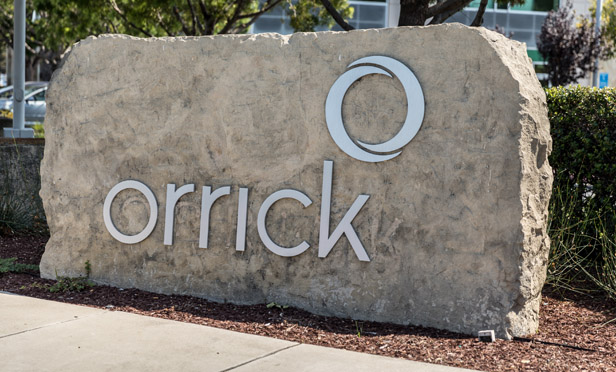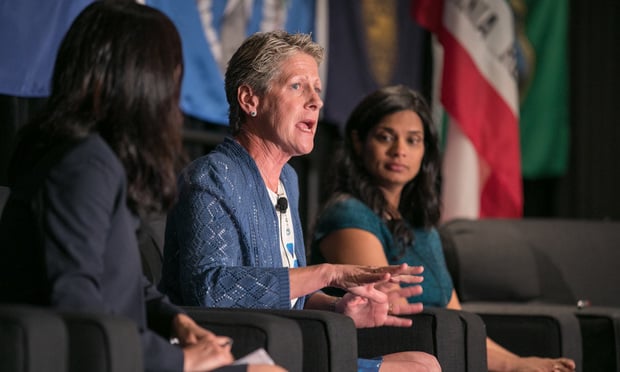US Labor Judge Warns Lawyers About 'Tone' in Oracle Discrimination Case
“I remind the government particularly that, 'counsel for the government has an interest only in the law being observed, not in victory or defeat in any particular litigation,'” a U.S. Labor Department judge wrote in a new ruling in the agency's long-running case against Oracle.
March 07, 2019 at 02:33 PM
5 minute read
The original version of this story was published on The Recorder
 Orrick, Herrington & Sutcliffe (Photo: Jason Doiy / ALM)
Orrick, Herrington & Sutcliffe (Photo: Jason Doiy / ALM)
A U.S. labor judge warned lawyers in a federal discrimination case against Oracle America Inc. to watch their “tone and manner,” while permitting the government to bring new and expanded claims alleging widespread bias against women and minorities.
Richard Clark, an administrative law judge, granted the U.S. Labor Department's request to file an amended complaint against Oracle that would include claims the company's discriminatory practices have cost women and minority workers more than $400 million in wages. Clark said the Labor Department's Office of Federal Contract Compliance Programs must still provide more details supporting the allegations.
Oracle's lawyers at Orrick, Herrington & Sutcliffe had accused the Labor Department of acting in “bad faith” and unfairly coordinating with plaintiffs attorneys who are suing the company in California state court. Clark, who is based in San Francisco, said he found it “troubling” how the government's lawyers moved to file the amended complaint, but he rejected Oracle's assertion that the agency had acted in bad faith.
Clark said he was concerned that the first three pages of the Labor Department's amended complaint “do not read like a court filing that one would expect from a government agency.” Those opening pages, he said, contained allegations that were not later included in the numbered paragraphs of the complaint. He chalked that up to a “simple drafting error,” but nothing malicious.
“I expect all parties and attorneys who practice before me to behave in a professional, courteous manner and avoid unnecessary and contentious litigation strategies that are often mistaken for zealous advocacy,” Clark wrote in his ruling Wednesday. “I remind the government particularly that, 'counsel for the government has an interest only in the law being observed, not in victory or defeat in any particular litigation.'”
Clark added: “Going forward, I caution all counsel to be cognizant of the tone and manner in which they pursue their arguments.”
The Office of Federal Contract Compliance Programs , or OFCCP, must file a revised complaint by March 18 that focuses “only upon the actual allegations” and excludes any “introductory” pages, Clark said.
Attorneys for Oracle declined to comment Thursday, and a Labor Department spokesman said the agency does not comment on pending matters.
Clark showed some sympathy for Oracle, saying the company was “frustrated with what it perceives as an unfair and opaque process.” He said the OFCCP “engaged in mediation for nearly a year while it was concurrently sharpening and revising its claims” and did not mention the imminent filing of a new complaint to the company's attorneys. He also said he would not likely let the government amend its claims any further.
“OFCCP has made very serious allegations that, if true, merit very serious remedies,” Clark said. “If those allegations cannot be substantiated, Oracle deserves to be able to clear its name and move on. If those allegations can be substantiated, the individuals harmed by the violations deserve relief. It is time to move this case forward to resolution, one way or the other. I expect both parties to cooperate in discovery and to disclose their claims, contentions, and evidentiary basis for them.”
The Labor Department's dispute with Oracle dates to 2014, when the agency conducted a workplace compliance audit. Federal contractors routinely face audits to ensure compliance with civil rights laws—and a contractor can lose current and future contracts based on any violations. Oracle receives roughly $100 million a year in government contractors, according to the Labor Department.
Oracle has denied its employment practices are discriminatory. “We fiercely disagree with the spurious claims and will continue in the process to prove them false,” Oracle's general counsel, Dorian Daley, said in January. “We are in compliance with our regulatory obligations, committed to equality, and proud of our employees.”
 Dorian Daley, Oracle general counsel. (Photo: Jason Doiy / ALM)
Dorian Daley, Oracle general counsel. (Photo: Jason Doiy / ALM)In the California state case, the plaintiffs lawyers are pushing for class certification on behalf of 4,000 women pursuing gender discrimination claims. The plaintiffs have alleged women make as much as $13,000 less on average than their male counterparts and receive smaller bonus and stock packages.
Orrick partner Erin Connell and senior counsel Gary Siniscalco, representing Oracle, responded this week to California state case.
Oracle argued, in court documents filed Wednesday, the the plaintiffs fail to identify an example of a court certifying a class under the state's equal pay law. The company alleged that the class certification effort “rests on distortions of the facts and the law.”
Plaintiffs lawyer Erin Pulaski, partner at Rudy, Exelrod, Zieff & Lowe and a lawyer for Oracle employees, said Thursday that two statistical analyses of the company's pay practices show “Oracle engaged in significant pay discrimination against women.” She added: “Oracle's opposition to class certification is nothing more than a procedural maneuver attempting to stymie its women employees' ability to vindicate their Equal Pay Act claims.”
Read Clark's ruling below:
Read More:
Orrick Team Accuses Labor Department of Bad Faith in Bias Case
Oracle Loses Bid to Thwart U.S. Labor Regulators in Discrimination Case
New Claims Against Oracle Confront Prior Salary as Discrimination Pathway
Why the U.S. Labor Dept. Is Dropping its Google Pay Data Appeal
This content has been archived. It is available through our partners, LexisNexis® and Bloomberg Law.
To view this content, please continue to their sites.
Not a Lexis Subscriber?
Subscribe Now
Not a Bloomberg Law Subscriber?
Subscribe Now
NOT FOR REPRINT
© 2025 ALM Global, LLC, All Rights Reserved. Request academic re-use from www.copyright.com. All other uses, submit a request to [email protected]. For more information visit Asset & Logo Licensing.
You Might Like
View All
Skadden and Steptoe, Defending Amex GBT, Blasts Biden DOJ's Antitrust Lawsuit Over Merger Proposal
4 minute read
'Lack of Independence' or 'Tethered to the Law'? Witnesses Speak on Bondi
4 minute read
Trending Stories
Who Got The Work
J. Brugh Lower of Gibbons has entered an appearance for industrial equipment supplier Devco Corporation in a pending trademark infringement lawsuit. The suit, accusing the defendant of selling knock-off Graco products, was filed Dec. 18 in New Jersey District Court by Rivkin Radler on behalf of Graco Inc. and Graco Minnesota. The case, assigned to U.S. District Judge Zahid N. Quraishi, is 3:24-cv-11294, Graco Inc. et al v. Devco Corporation.
Who Got The Work
Rebecca Maller-Stein and Kent A. Yalowitz of Arnold & Porter Kaye Scholer have entered their appearances for Hanaco Venture Capital and its executives, Lior Prosor and David Frankel, in a pending securities lawsuit. The action, filed on Dec. 24 in New York Southern District Court by Zell, Aron & Co. on behalf of Goldeneye Advisors, accuses the defendants of negligently and fraudulently managing the plaintiff's $1 million investment. The case, assigned to U.S. District Judge Vernon S. Broderick, is 1:24-cv-09918, Goldeneye Advisors, LLC v. Hanaco Venture Capital, Ltd. et al.
Who Got The Work
Attorneys from A&O Shearman has stepped in as defense counsel for Toronto-Dominion Bank and other defendants in a pending securities class action. The suit, filed Dec. 11 in New York Southern District Court by Bleichmar Fonti & Auld, accuses the defendants of concealing the bank's 'pervasive' deficiencies in regards to its compliance with the Bank Secrecy Act and the quality of its anti-money laundering controls. The case, assigned to U.S. District Judge Arun Subramanian, is 1:24-cv-09445, Gonzalez v. The Toronto-Dominion Bank et al.
Who Got The Work
Crown Castle International, a Pennsylvania company providing shared communications infrastructure, has turned to Luke D. Wolf of Gordon Rees Scully Mansukhani to fend off a pending breach-of-contract lawsuit. The court action, filed Nov. 25 in Michigan Eastern District Court by Hooper Hathaway PC on behalf of The Town Residences LLC, accuses Crown Castle of failing to transfer approximately $30,000 in utility payments from T-Mobile in breach of a roof-top lease and assignment agreement. The case, assigned to U.S. District Judge Susan K. Declercq, is 2:24-cv-13131, The Town Residences LLC v. T-Mobile US, Inc. et al.
Who Got The Work
Wilfred P. Coronato and Daniel M. Schwartz of McCarter & English have stepped in as defense counsel to Electrolux Home Products Inc. in a pending product liability lawsuit. The court action, filed Nov. 26 in New York Eastern District Court by Poulos Lopiccolo PC and Nagel Rice LLP on behalf of David Stern, alleges that the defendant's refrigerators’ drawers and shelving repeatedly break and fall apart within months after purchase. The case, assigned to U.S. District Judge Joan M. Azrack, is 2:24-cv-08204, Stern v. Electrolux Home Products, Inc.











